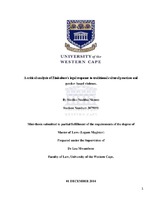A critical analysis of Zimbabwe’s legal response to traditional cultural practices and gender- based violence.
Abstract
The aim of the study was to assess Zimbabwe‘s legal response to gender-based violence that can be to traditional cultural practices. First, most traditional cultural practices in Zimbabwe are discriminatory towards women and girls; the study has therefore shown the link between gender-based violence and traditional cultural practices. Second, it has been shown that the recognition of the right to culture by international and regional instruments is subject to non-violation of human rights. Third, the min-thesis has also established that in complying with its international obligations on the protection of women from gender-based violence linked to traditional cultural practices, Zimbabwe has enacted a plethora of legislation. More importantly, the study has also proven that despite these legal initiatives, gender-based violence linked to traditional cultural practices still continues. This mini-thesis has, among other factors, highlighted the following as shortfalls in legislations passed to address this problem: poor enforcement of these laws; Zimbabwe‘s hybrid legal system where customary law operates in conjunction with civil laws; weak wording of some pieces of legislation, such as legislation that deals with marriage rights for women married under customary law; and that most women, especially those in rural areas are not fully equipped with the knowledge of the different pieces of legislation that have been put in place to protect them from such violence.

